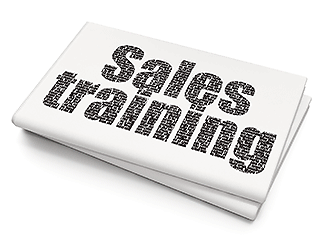Do you run a business or sales training program and want to see long-term gains? Here is how you can create sales training programs that will last.
Sales Training Programs
 In previous days, sales training programs would last anywhere from three to six months. The new employee wasn't put through customer-intense training. [quotesright]Today, employees are lucky to get three to six weeks of training. [/quotesright]
In previous days, sales training programs would last anywhere from three to six months. The new employee wasn't put through customer-intense training. [quotesright]Today, employees are lucky to get three to six weeks of training. [/quotesright]
Those who have experienced the length change, prefer longer sales training. They believe that this increases sales and employee quality. You can't ignore the evidence for longer time spent, though it isn't the only method to making training stick. Unfortunately, not everyone has the luxury of providing six-month sales training programs.
[quotes]How can you bridge the gaps in learning and understanding due to such abbreviated training?[/quotes] Answer: Formal, planned follow-up training that educates on and refines sales skills.
How to Improve Sales Training Programs
 There are three big differences between average and successful sales training programs:
There are three big differences between average and successful sales training programs:
1. Structure of Training
When it comes to effective sales training programs, you need to have a plan. [quotesright]This plan needs to include more than slapping a sales pitch in front of your newest employee. [/quotesright] Practice calls with those scripts are helpful, but not effective enough as training.
To get to a place where you can run successful training, there are some things you need to do first. One of those is to see where current or new employees are in their skill sets.
Assess
You can anecdotally find out what your employees know, what they don't, and what they succeed at and struggle with. [quotesright]This way, you can find some common themes to structure your training around. [/quotesright]
How do you do this? One way is to create a list of employees who are at different levels of success. Don't leave out the least successful employees! What do they not do that the most successful ones do?
That might be the sweet spot that can take your low-level sellers to high-level sales! Use your employees; ask them what they'd like more training on. They're more likely to listen when it's something they're interested in.
You can do this by creating surveys or talking to people one on one. Don't make them feel like they're singled out though, especially if they don't perform as well. Keep it casual. Words like "performance review" incite fear in employees.
You can ask people to volunteer what they took away from your last training at your next one. This is a good method to see what people are taking away from your lesson and if it's different than what you thought they would.
[quotes]An even better way is to use sales skill assessments[/quotes] to determine the areas where each person is strong and weak, and design training around the skills each person needs to improve. Hiring the right person the first time saves you thousands of times what you could have learned from a personnel assessment.
[quotesright]If you would like to know more about how you can hire the right person for the job, even sales, let's talk.[/quotesright] We have proven solutions for assessing candidate suitability and likely performance in a position.
Plan
 Now you know the strengths and weaknesses of your existing sales training program. Plan for your new and improved one, taking the above insights into account. You don't need to restructure your entire program and start from scratch – you can add things in as needed.
Now you know the strengths and weaknesses of your existing sales training program. Plan for your new and improved one, taking the above insights into account. You don't need to restructure your entire program and start from scratch – you can add things in as needed.
When planning training for new employees and especially current employees, shorter is better. People don't like going to lectures that drone on and on, even if they're well done. Businesses have shown that it's more successful to do more frequent but shorter training sessions.
Don't think of your training like a boot camp or a lecture, but as a series of lesson plans spread over a "semester." Teachers can't teach an entire curriculum in a week and neither can (or should) you.
If you want to change behavior, you must have built-in follow-up training to reinforce the lessons covered, add new lessons, and change behavior. [quotesright]Failure to do this has doomed many sales training programs, resulting with lost productivity and lower sales than should have occurred. [/quotesright]
2. Psychology of structure
[quotes]Limit training sessions or lessons to a few topics at a time.[/quotes] For example, have one on your top-selling products and another on your least successful. Make sure employees get to know your products thoroughly and almost personally.
Spend an entire training talking about what makes your company unique and valuable so your team can communicate that to customers.
You'll want to [quotes]keep things engaging during the training session.[/quotes] Keeping people involved cuts down on boredom and improves retention.
You can even [quotesright]offer incentives[/quotesright] for attending training programs and program reviews. Think small, but valuable things like providing people with good sales leads. Recognize people for their hard work and give rewards for multiple training sessions attended in a row.
[quotes]You need to make the employees want to go to your sales training.[/quotes] As part of your sales training program, you'll need to think about psychology. How are you making your employees feel? What do they walk away from training thinking about? Do they feel like they learned something that will help them be better sales people and earn higher commissions? Which brings us to…
[sidebar]
How to Find Professional Sales Training
That Delivers Lasting Improvement
As a FocalPoint Coach and Trainers, we deliver sales training programs tailored exactly to the needs of our clients that change performance long term.
With follow-up training and hundreds of testimonials, you can be certain you will get results that last, maximizing your training investment.
If you’d like to discuss how we can help you take your sales force’s performance up permanently and close more deals faster, simply let me know. I’ll be happy to explain our process to you. USA: 877.433.6225 feedback@focalpointcoaching.com
[/sidebar]
3. Employee Mood
An Entrepreneur article found, unsurprisingly, that employee mindset matters. [quotesright]Employees need to feel like they can benefit personally[/quotesright] from your sales training program. How do you make this happen?
When you're doing your training or announcing them be positive! Use inspiring workshop titles or fun themes. Most importantly, [quotes]concentrate on what the employees will get out of it.[/quotes]
Will going to more training make them more likely to get promoted? Will they make more money? Qualify for incentives? These are the things that pull employees in and make them pay attention.
If this sounds shallow, remember that human instinct wants to ensure being the best. It's a survival tactic that is long forgotten but still relevant in psychology. Unhappy employees are much less successful than happy ones.
Is it manipulative to use this psychology to structure your sales training programs? Not even remotely because it's not the bad kind of manipulation. Think of it as applied psychology that will benefit your business and your employees.
Review
Do you remember what you learned in college psychology class? Probably not. Forgetting is something humans do best. [quotesright]Researchers believe that we forget 50-80 percent of what we learn by the next day. [/quotesright]
So how do you prevent this? Have your employees review the material! After a sales training program, send an email with highlights from the training the next day. You can even sprinkle in incentives randomly for those who read your summary.
For example, in the middle of your summary insert a sentence saying, "The first five people to email me this (word) get something". The human brain loves rewards, they make people happy!
Even if you just do one thing from this list to improve your sales training programs, we think you'll see better results. What it all comes down to in the end is the value of your product, the quality of the education you provide, and the willingness of your employees to learn.
Which of these sales training programs tactics will you implement first?














